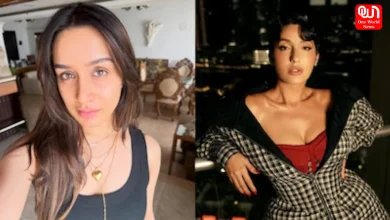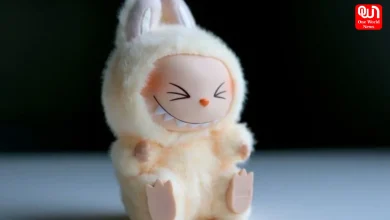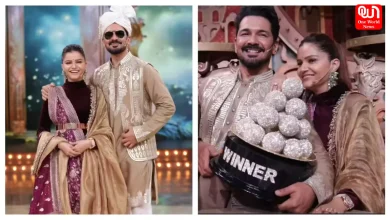OWN Exclusive: Interview With Manish Tripathi
Manish Tripathi, a distinguished figure in fashion, designed Ram Lala's attire, showcasing his cultural impact. Amid criticism of the consecration ceremony, he upholds Sanatan Dharma's diversity. His journey reflects resilience, innovation, and a profound connection to both his craft and culture.
Manish Tripathi: Renowned Fashion Designer who designed “priceless” and “magnificent” attire of ‘Ram Lala’
Manish Tripathi is a highly respected figure in the fashion world, known for his innovative ideas and valuable contributions. He founded Muktir Fashion India Ltd and owns DesignMee, where he showcases his exceptional talent. With a degree from NIFT Delhi, Manish’s passion for fashion is evident in his remarkable journey. Notably, he’s the creative mind behind the design of the attire for Ram Lala, further highlighting his versatility and significant role in shaping cultural and religious representations through fashion.
Beyond fashion, Manish is committed to preserving India’s textile heritage. His creative genius extends beyond religious attire to impactful collaborations, including crafting jerseys for the Indian cricket team and designing uniforms for the Indian Army and BSF. Through his artistry, Manish Tripathi continues to shape Indian fashion, leaving an enduring legacy.
What was your reaction upon learning about the opportunity to design VASTRA for Ram Lala? How did you come across this opportunity?
It is truly more than a miracle for any devotee. We all worship and pray to God daily, hoping that our prayers are heard and that one day, our wishes will be fulfilled. So, I can say that God has indeed granted my years-long wish. This opportunity to serve God is nothing less than a blessing. Everyone carries a mental image of Ram Lala, yet nobody has seen Him. Therefore, it was a surprise for everyone, including myself, when the opportunity arose. Even before this opportunity presented itself, I had envisioned designs for the attire of Ram Lala. It never crossed my mind who would have the honor of executing those designs. The fact that I was given this chance is beyond what I could have ever hoped for. Even now, I find it difficult to articulate the magnitude of that moment. I am at a loss for words. This experience has left me in awe, and I often wonder how it all transpired. It’s a feeling that goes beyond explanation; it’s as if divine intervention led me to this incredible opportunity.
We’re now on WhatsApp. Click to join.
What challenges did you encounter while designing the ‘Vastra’ for Ram Lala?
“When it comes to the work of God, He operates through us, utilizing us as His instruments. I feel immensely blessed that God has chosen me to be the conduit for His divine work. Despite encountering numerous challenges along the way, there has always been a profound sense of assurance that when it is God’s work, everything unfolds seamlessly. He effortlessly clears away obstacles and paves the path for His mission to be fulfilled.
Read More:- Cassandra Mae sings Ram Aayenge before Ayodhya Ram Mandir Inauguration
As a professional designer, I faced various technical hurdles, such as determining the intricate arrangements of drapes for the dhoti and cowl. Yet, beyond the technical aspects, there was an inner challenge of establishing a profound connection with God. One of the greatest challenges was maintaining a dialogue with an idol that had not yet been consecrated. However, through divine grace, I was granted the opportunity to engage in a conversation with that idol. In this sacred exchange, I sought insights into the divine, and remarkably, the idol responded, revealing its essence and significance, particularly concerning its attire. Indeed, being a conduit for God’s work is a humbling and transformative experience, one where challenges are overcome, and connections with the divine are forged.”
How did you choose the particular fabric and design for the attire (Vastra)?
We were provided with specific color codes and briefs regarding the divine nature of Prabhu Shree Ram Lala – that he is a tender 5-year-old child, embodying softness, and revered as the son of the illustrious Chakravarty Raja Dashrath. He epitomizes the concept of Maryada Purushottam. These directives were entrusted to us by the trust. Simultaneously, there was a profound faith placed upon us, believing that this opportunity had been granted for us to execute in the best possible manner. It transcended mere designing; it encompassed the hopes and beliefs of millions who had awaited Ram Lalla for over 500 years. Therefore, the responsibility of selecting fabric or any aspect of his attire was not solely ours. Who are we to make such decisions for the divine? When it was determined that God would adorn different colors on various days, the day of the consecration ceremony demanded special consideration. Bhagwan Shri Ram is considered the avatar of Bhagwan Vishnu, and hence, we chose the esteemed Pitambari fabric, steeped in a legacy dating back over a millennium. This fabric, crafted in Kashi, utilizes real gold and silver threads, a testament to its opulence and historical significance. Even before being formally tasked, I had begun preparing this attire out of sheer devotion. However, when the opportunity presented itself, it was evident that a single option would not suffice, even for God. Contemplating that Raja Dashrath himself would undoubtedly have chosen nothing but the best for his beloved child, I meticulously researched and brought forth an array of options. Thus, when the decision was made to clothe God in Pitambari, I had already procured numerous selections of vibrant yellows. In essence, the process was a manifestation of dedication, reverence, and meticulous attention to detail, all guided by the profound faith placed in us to fulfill this sacred duty. As a cohesive team working towards a shared goal, we encountered moments of indecision. Feeling overwhelmed, I allowed myself to express my emotions to Prabhu, earnestly seeking divine guidance through a dream. However, the night passed without any such occurrence. Yet, the following day brought an unexpected miracle. Upon arriving at our workspace to commence work on the divine attire, we discovered that the fabric we had originally chosen for Bhagwan’s Vastra was inexplicably missing. Undeterred by this unforeseen setback, we swiftly turned to our second option. Despite the initial uncertainty, as the final creation took form, it was met with widespread acclaim. In retrospect, it seemed as though divine intervention had orchestrated the course of events, guiding us toward the perfect outcome. Though our initial choice had vanished, it paved the way for an alternative that ultimately resonated with people’s hearts. Thus, in the face of uncertainty, faith and perseverance prevailed, leading to a manifestation of divine grace in our collective endeavor.
What will your next project be?
Currently, I am deeply involved in a significant project focused on Dhwaj, with a pivotal aim of providing sustainable employment opportunities for 100,000 women. The overarching vision aligns with the aspirations set forth by Prime Minister Modi, emphasizing the importance of generating additional income in every household across the nation. This initiative seeks to empower women, enabling them to earn a livelihood and contribute to their families and communities. Under this initiative, we aim to establish a network of “Shram Sadhaks” – individuals dedicated to labor and productivity – who will serve as the backbone of this endeavor. By harnessing their skills and capabilities, we endeavor to uplift entire villages and communities, fostering economic prosperity at the grassroots level. Our approach involves reaching out to villages across the length and breadth of the nation, ensuring that no region is left untouched by the transformative potential of this initiative. Through comprehensive outreach and engagement efforts, we will provide training, resources, and support to enable women to engage in productive endeavors, thereby creating a ripple effect of positive change.
What is your opinion on those who criticized the consecration ceremony, questioning how the puja could take place when the temple has not yet been completed?
Indeed, there is a saying that Bhagwan Ram is the king of the world, and all beings, whether gods or demons, play a role in his divine plan. Everyone holds their personal opinions, and that’s the beauty of Sanatan Dharma – it embraces diversity and acceptance. Regardless of one’s viewpoint, we welcome them wholeheartedly. It’s worth noting that there have been countless instances of pujas and ceremonies conducted without tangible evidence of their subject’s existence. It’s not for me to pass judgment on others. Based on what I have seen and heard, I can only say that those who spread misinformation or speak ill will bear the consequences of their actions. I earnestly hope that God grants them wisdom and understanding.
Like this post?
Register at One World News to never miss out on videos, celeb interviews, and best reads.








